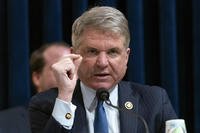President Donald Trump signed an executive order Thursday as a first step in holding poorly performing employees at the Department of Veterans Affairs more accountable.
The order also would seek to protect whistleblowers at the VA from reprisals for reporting on wrongdoing at the VA, which serves nine million veterans annually.
At a ceremony at VA headquarters, Trump, accompanied by Vice President Mike Pence, said the order would create an Office of Accountability and Whistleblower Protection within the VA whose head would report directly to new VA Secretary Dr. David Shulkin.
"We're going to protect the people who are protecting us," said Trump, who made VA reform one of the major issues in his campaign for the White House.
"We're not going to let them down," the president said.
The order "makes it clear that we will never ever tolerate substandard care for our great veterans," he said but acknowledged that Congress must pass legislation to back up the order and give Shulkin the authority to bypass the due process of existing civil service rules and go beyond simply identifying wrongdoers.
Shulkin said as much at a White House briefing on the order Wednesday. The executive order calls on the VA to do what it can internally, "but we know that that's not going to be enough to get done what I want to get done," he said.
Shulkin said he needs authority from Congress "to be able to, once we identify people that need to leave the organization, to get them out quickly. So I do need legislative help as well."
Trump noted in signing the order that he was acting three years after the wait-times scandal at the VA in Phoenix, Arizona, that may have led to the deaths of as many as 40 veterans. "Those who fail our veterans will be held for the first time accountable," he said, and at the same time "we'll reward those who do a fantastic job."
Two major veterans service organizations generally applauded Trump's action.
"The American Legion is encouraged by the president's executive order," said Joe Plenzler, a spokesman for the Washington headquarters of the Legion.
However, "we have called upon the U.S. Congress to enact legislation to provide the VA secretary the authority to remove any individual from the department that warrants removal or to transfer poorly performing individuals to other general schedule positions without any increase in pay or benefits."
The Veterans of Foreign Wars supports legislation to give Shulkin more authority to fire employees and to protect whistleblowers, said VFW National Commander Brian Duffy, but he said passing the legislation could be difficult.
In a statement, Duffy said, "Any new personnel regulation intended to apply only to VA employees will impact all federal civilians in every government agency. This explains the pushback from unions and perhaps the hesitance by some in Congress to support the reform legislation, despite their many promises to fix the VA."
Rep. Tim Walz of Minnesota, the ranking Democrat on the House Veterans Affairs Committee, said the legislation had little chance of passing in the Senate and he faulted Trump for what he said was a belated move by Republicans to press for accountability at the VA.
"It is ridiculous that Trump is going to take credit for this proposal and point to it as a major success during his first 100 days in the White House," Walz said in a statement.
"From the beginning, the idea to create this office was championed for multiple Congresses by Democrats, despite Republican attempts to stonewall its implementation because they were unwilling to invest the relatively small amount of money required to create the new office and staff it appropriately," he said.
Walz said the proposed legislation "has very little chance of passing in the Senate" because it "would undermine workplace protections for frontline employees and therefore dissuade them from stepping forward out of fear of retribution from bad managers."
-- Richard Sisk can be reached at Richard.Sisk@Military.com.































